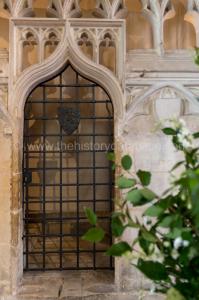Trial and Execution of Ankarette Twynyho
Trial and Execution of Ankarette Twynyho is in 1471-1483 Edward IV Second Reign.
On 22 Dec 1476 Isabel Neville Duchess Clarence (age 25) died from childbirth. The cause of death unknown but likely a consequence of the birth of her fourth child Richard in early October. She was buried in Tewkesbury Abbey [Map]. George York 1st Duke of Clarence (age 27) believed she had been murdered by Ankarette Hawkeston aka Twynyho. See Trial and Execution of Ankarette Twynyho.

Ankarette Hawkeston aka Twynyho: Around 1435 William Twynyho and she were married.

On 12 Apr 1477 Ankarette Hawkeston aka Twynyho was arrested at Keyford, Somerset and taken to Bath, Somerset [Map]. George York 1st Duke of Clarence (age 27) believed she had murdered his wife Isabel Neville Duchess Clarence who had died four months before.

On 13 Apr 1477 Ankarette Hawkeston aka Twynyho taken to Cirencester, Gloucestershire [Map].
On 15 Apr 1477 Ankarette Hawkeston aka Twynyho and John Thursby were hanged at Myton Gallows, Warwick [Map].
Calendars. 20 Feb 1478. Exemplification, at the request of Roger Twynyho (age 18), kinsman and heir of Ankarette late the wife of William Twynyho of Cayforde, co. Somerset, esquire, viz. son of John their son, of the following:-
1. A petition (English) of the said Roger in the present Parlimnent that whereas the said Ankarette on Saturday, 12 April, 17 Edward IV, was in her manor at Cayford and Richard Hyde late of Warwick, gentlelman, and Roger Strange late of Bekehampton, co. Somerset, towker, with divers riotous persons to the number of fourscore by the connnand of George, duke of Clarence. cane to Cayforde about two of the clock after noon and entered her house and carried her off the same day to Bath and from thence on the Sunday following to Circeter, co. Gloucester, and from thence to Warwick, whither they brought her on the Monday following about eight of the clock in the afternoon, which town of Warwick is distant from Cayforde seventy Iniles, and then and there took from her all her jewels, money and goods and also in the said duke's behalf, as though he had used king's power, commanded Thomas Delalynde, esquire, and Edith (age 30) his wife, daughter of the said Ankarette, and their servants to avoid from the town of Warwick and lodge them at Strattforde upon Aven that night, six miles thence, and the said duke kept Ankarette in prison unto the hour of nine before noon on the morrow, to wit, Tuesday after the closing of Pasche, and then caused her to be brought to the Guildhall at Warwick before divers of the justices of the peace in the county then sitting in sessions and caused her to be indicted by the name of Ankarette Twynneowe, late of Warwick, widow, late servant of the duke and Isabel his wife, of having at Warwick on 10 October, 16 Edward IV. , given to the said Isabel a venomous drink of ale mixed with poison, of which the latter sickened until the Sunday before Christmas, on which day she died, and the justices arraigned the said Ankarette and a jury appeared and found her guilty and it was considered that she should be led from the bar there to the gaol of Warwick and thence should bc drawn through the town to the gallows of Myton and hanged till she were dead, and the sheriff was commanded to do execution and so he did which indictment, trial and judgment were done and given within three hours of the said Tuesday, and the jurors for fear gave the verdict contrary to their conscience, in proof whereof divers of them came to the said Ankarette in remorse and asked her forgiveness in consideration of the imaginations of the said duke and his great might the unlawful taking of the said Ankarette through three several shires, tho inordinate hasty process and judgcqnent, her lamentable death and her good disposition, the king should ordain that the record, process, verdict and judgement void and of no effect, but that as the prenlises were done by the command of the said Duke the said justices and sheriff and the under-sheriff and their ministers should not be vexed.
2. The answer of the king: Soit fait come il est desire. [Let it be done]
3. A schedule annexed to the petition, being the inquisition taken as above before John Hugford, esquire, Henry Boteler and John West, justices, by oath of Richard Fulwod, esquire, Baldwin Porter, esquire, Willimn Bary of Berton. Thomas Waynwright of Stretford, Richard Hasilholt of Alcestre, John Grove of Aspeley, John Shawe of Alcestre, Robert Plummer of Warwick, John Goodman of the sarne, John Page of Wyllyngton, Robert Toly of Bormyngton and William Gibbons of Honyngton.
4. A writ attested by H. Boteler directing the sheriff to impanel a jury of twenty-four.